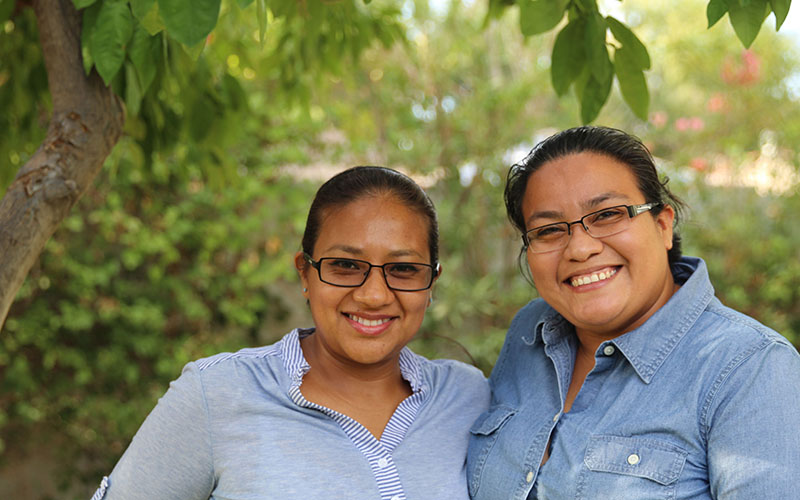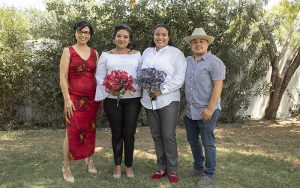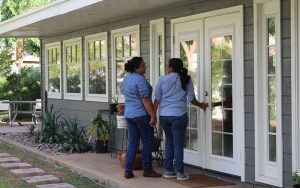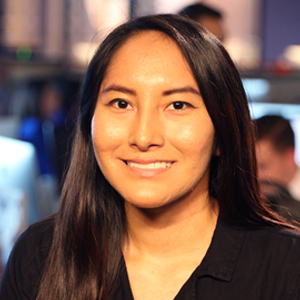
Iris del Carmen Flores, left, and her wife, Yadira Mendez Barrientos, are living in metro Phoenix with their dogs. They have been granted asylum in the U.S. (Photo by Kalle Benallie/Cronkite News)
PHOENIX – Dogs barked in the distance as a knock came on the door of the home shared by Iris del Carmen Flores and her partner, Yadira Mendez Barrientos. It was the middle of the night Dec. 2. The women opened their door to find two armed men, dressed all in black and demanding to know whether they had reported the crime that plagued their neighborhood in Izabal state, east of Guatemala City, the country’s capital.
They had.
When a gun was pointed at the head of a neighbor, Barrientos reported it to the Guatemalan Public Ministry, which is that country’s department of justice. But her complaint, Barrientos said, was ignored.
The couple were able to survive that night because their numerous dogs scared the gunmen away. However, the incident was the final straw for them, stemming from their lack of faith in the Public Ministry.
“They weren’t going to do anything. We were just going to be statistics of death,” Barrios said in Spanish.
Adding to their already complicated security situation was their union as a lesbian couple. By the time the black-clad gunmen knocked on their door, they had been receiving anonymous threats for about a year. Yadira and Iris del Carmen said people would pass by their home to taunt them, and a car with dark-tinted windows repeatedly drove by their home.
Guatemala decriminalized gay activity in 1871, but the country does not recognize same-sex couples.

Rosario Beck, left, served as sponsor for Iris del Carmen Flores and Yadira Mendez Barrientos when they sought asylum, and she offered her Phoenix backyard for the couple’s wedding in June. (Photo by Kalle Benallie/Cronkite News)
Barrientos and Flores tried to live with Flores’ family, but her mother worried over the safety of the young children living in the house, forcing the couple to move out. They crossed the Guatemala-Mexico border on foot at Chihuahua, Mexico, and hired a “coyote,” someone who guides undocumented migrants across borders.
The journey on the crowded bus, they said, was incredibly hard.
“That was horrible because we looked like pigs in those trucks,” Flores recalled. “And we didn’t have any way of holding ourselves up. They would just throw us in. It was very traumatic, very hard.”
Despite the difficult conditions, they made it to Lukeville, on the Mexico border in Pima County, seven days later. They were detained and later sent separately to the Eloy Detention Center; Flores on Dec. 23 and Barrientos on Dec. 28. The center is run by Immigration and Customs Enforcement.
“They would take away our soap. They would only give us two feminine pads a day. Pads that didn’t work. It was a problem to ask for more,” Flores said.
Once in Eloy, the couple were connected to Trans Queer Pueblo, a grassroots group that works for “the liberation of LGBTQ migrant communities” in Phoenix who are in or out of detention centers, according to its website.
Working alongside the Florence Project, a nonprofit that provides free legal and social services to adults and unaccompanied children in immigration custody in Arizona, Trans Queer Pueblo was able to lower the bonds for Flores and Barrientos and eventually help get their asylum request granted.
In July, the couple won their asylum case, which is rare.
In fiscal year 2018, 42,224 asylum cases were considered and 14,200 – 35% – were granted.
The couple also found refuge among the Trans Queer Pueblo community. Rosario Beck, the mother of the group’s media coordinator, became their sponsor.
They met when Beck, an immigrant and Trans Queer Pueblo volunteer, visited Barrientos at the Eloy Detention Center.
“The thing that I liked the best about Yadira is her beautiful smile. She struck me as a very serious person,” Beck said of their first meeting.
When Beck’s daughter suggested the couple needed a sponsor, Beck jumped at the chance because of her own experience as an immigrant from Peru.
“I have been lucky enough to have the privilege of having my citizenship in this country for many years, being able to own a house, being able to have a job, to have a car. So with Yadira and Iris, and with a lot of people, I see myself,” Beck said.
Barrientos was released from Eloy on March 19 and Flores April 9.
Both said they were sick and emotionally distraught from their experience at the detention center. But they were able to marry in June in Beck’s backyard with help from Trans Queer Pueblo members and others.
“A friend of mine officiated the ceremony, everything was free, somebody else brought the food, some people from TQP decided, ‘Let’s bring some flowers,'” Beck said.
Beck said Flores wants to pursue a degree in health, but the couple are waiting to finalize their immigration documents first. They’re still living with Beck, but she doesn’t mind.
“I said, ‘I’m not going to put you out in the streets and that’s it, my job is done.'”
While Flores and Barrientos ease into their new life, they have found outlets for the trauma and hardships they’ve endured. As a way to heal, both women participated in the project In the Land of My Body, a workshop designed to map out feelings related to their physical experiences. They made a collage of fauna and flora from Guatemala.
“Personally, I never had the opportunity in my country to express myself artistically in this way,” Barrientos said. “In Guatemala, I always thought that drawing or art was just kind of a waste of time.”
The art they created was recently featured in Trans Queer Pueblo’s Queer Artivismo: Independencia event, which celebrates Central American and Mexican independence, in addition to LGBTQ artistic expression. Held every other month, it consists of an art gallery presentation, a drag show and other performances. The goal is to raise money to assist migrants who are released from detention centers and provide medical services for undocumented immigrants.
Adrianna Gonzales comes to Trans Queer Pueblo events because they provide a sense of community.
“Every time I walk into this space, it feels like family,” she said of the group’s headquarters on East Roosevelt Street. “There’s food in the kitchen and there’s some people walking around. It’s a form of resistance with a bunch of queer folks in the space, a lot of trans people and a lot of undocumented people.”
Dagoberto Bailon, general assistant with Trans Queer Pueblo, said art “allows people to engage in their own way. We do all of these cultural events to really be an anchor for people who have migrated and need to build a community.”
Bailon said the grassroots group is aware of the strong border ties in Phoenix, so staff members and volunteers make sure “we do everything hyperlocal, understanding that because we live in Arizona, we’re more in tune with the politics and everything that is happening.”
Flores and Barrientos said Trans Queer Pueblo has provided them with the resources to know their rights. They’re now both also a part of leadership teams within Trans Queer Pueblo, reaching out to other LGBTQ migrants.
“Trans Queer Pueblo has given us a lot of tools to express ourselves, and it’s been a really vital way to get out what we feel inside,” Flores said.
“It has been a really important brick in the new wall of life that we are building here in this country,” Barrientos added.

Guatemalan asylum seekers, Iris del Carmen Flores and Yadira Mendez Barrientos, recently came to the Phoenix metro looking for a safe space as an LGBTQ couple. (Photo by Kalle Benallie/Cronkite News)
For now, their daily lives consist of attending meetings at Trans Queer Pueblo and cooking meals at home. Beck helps by driving the couple when they need to run errands.
“We usually go to the market together because Yadira likes to cook. She’s a really good cook,” Beck said. “Normally beans, rice, or soups. It’s nice for me to come home.”
It’s clear Beck and Yadira and Iris del Carmen have become close over this past year.
“I think this relationship is just the beginning. … They make my life richer and I know I make their lives more comfortable,” Beck said. “I think they really honestly care for me and love me in the same way I do.”
The next fundraising event for Trans Queer Pueblo is Drag for a Dream, which will take place Nov. 9 at Karamba nightclub with a goal of raising $15,000 for their programs.








